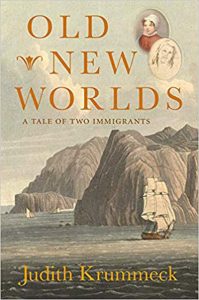Judith Krummeck’s book on her family’s immigrant history makes for a compelling read
Like many Baltimoreans, I’ve know Judith Krummeck as a first-rate broadcaster on the popular classical music station WBJC. She has been the evening drive time host there since 1998. In fact, Krummeck’s voice is so familiar, you think she’s part of the family.
A native of South Africa, Krummeck immigrated to the United States in 1997, with her husband Douglas Blackstone, a musician. Both had been married previously. He first landed a job with a symphony orchestra in Wheeling, WVA. Douglas played the French Horn. Not long after that Krummeck read of a job opening at WBJC.
The author considered the posting for the WBJC job “too good to be true.” This is the kind of position that she had repeatedly daydreamed about getting. On that first visit to Baltimore for the interview at the station, she also got a chance see and like more of the city that she would soon be calling home.
In her salad days, Krummeck had been an actor in Cape Town, South Africa, and the arts editor for the SAfm at the South African Broadcasting Corporation. Her professional background is evident in how she skillfully presents her very smooth, likable persona to her many fans in the WBJC radio audience.
Listening to the call of her Muse, Krummeck has published a riveting book entitled: “Old New Worlds: A Tale of Two Immigrants,” NonFiction/$24.95, 360 Pages, Green Place Books. Her skills as a writer are on displayed on page after page.
 (“Old New Worlds” can be ordered on Amazon.}
(“Old New Worlds” can be ordered on Amazon.}
The focus of Krummeck’s book is her great-great grandmother – Sarah Williams. Born in England, she later married in 1815, George Barker, also British, a Protestant missionary, and want-to-be minister. Thanks to his church connections, they then set sail pronto for Cape Town, South Africa. He hoped to sustain a missionary post and gain entry into the clergy. Previously, Sarah had worked as a housemaid and George as a blacksmith. Sarah was his second choice for a bride, but that didn’t seem to bother her. Krummeck wonders: “Was he on the rebound?”
Krummeck relates Sarah’s difficult tale of survival and triumph, through genealogical searchings, and via diaries and letters. She also visits various missions stations in South Africa. She also writes of her own personal story of immigration from South Africa to America. Her narrative slowly becomes intertwined with the development of Sarah’s drama into what the author called a “deep emotional bond” with her beloved ancestor.
Back then, depending on what day of the week it was, the colonial rulers in South Africa, were the Dutch (the Boers) and the British. For most of Krummeck’s book, the British were on top, until one of the local native tribes, the Xhosas, staged a revolt. Krummeck covers some of that bloody drama in her book.
What was it like for the newlyweds once they got out of Cape Town? Think Wild Wild West time in post-colonial America!
Try also horses, dirt roads, the weather sometimes most foul, especially in howling rainstorms, and covered wagons pulled by oxen. Sarah described their first mission station of Bethelsdorp, on November 18, 1815, as though it were part of the scenery for a desolate John Wayne cowboy western.
As the fates would have it, Sarah gave birth to her first child that very same night. It was a girl, who was later baptized days later as “Sarah” in the Bethelsdorp church. “Baby Sarah” was her first child, many more would happily follow, along with the pain of miscarriages.
Growing up in South Africa, Krummeck had a close-up view of the evils of apartheid. Politically, she supported the liberal Progressive Party. Her brother, Peter, however, was more active to the extent, “his mail was opened by the secret police during apartheid.” When Peter came to America, he stayed at his sister’s residence in Baltimore as he toured with his one-man show, “Bonhoeffer,” who was an “anti-Nazi theologian and martyr.”
The first time Krummeck voted for a winning candidate in America was when she cast her ballot, in 2006, for our boy-oh himself, Martin O’Malley, for governor of Maryland. She shared the thrill she got, too, from seeing President-elect Barack Obama at a massive rally at the War Memorial, in Baltimore, on a very frigid January 17, 2009. It was just days before he was sworn in as our country’s 44th president.

Questions: Will George Barker, a native of England, have a fulfilling life as a missionary/minister in the harsh, mostly barren lands of South Africa? When will he become a “fully ordained minister” serving the settlers’ community? What about his young wife, Sarah? Her status is only a little above that of a house servant! She has no assets of her own, can’t vote and is totally dependent on her husband, who is caught up in the religious life 24/7. As for any kind of decent medical care in that bygone era, especially out in the boondocks, it was a rarity for sure.
Well, Krummeck answers these questions and many more in her book. She does it with flowing prose, too, that makes her gem of a tale an easy read while bringing the main characters to life. I’m giving “Old New Worlds” five stars and predicting the author’s many radio fans will be very happy to get their hands on her new book.

Bill Hughes is an attorney, author, actor and photographer. His latest book is “Byline Baltimore.” It can be found at: https://www.amazon.com/William-Hughes/e/B00N7MGPXO/ref=dp_byline_cont_book_1

